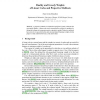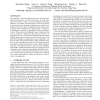117 search results - page 21 / 24 » What do we know about the Metropolis algorithm |
AAECC
2001
Springer
13 years 12 months ago
2001
Springer
A projective multiset is a collection of projective points, which are not necessarily distinct. A linear code can be represented as a projective multiset, by taking the columns of ...
HRI
2006
ACM
14 years 1 months ago
2006
ACM
The essence of the signal-to-symbol problem consists of associating a symbolic description of an object (e.g., a chair) to a signal (e.g., an image) that captures the real object....
AAAI
2007
13 years 9 months ago
2007
Recent work on online auctions for digital goods has explored the role of optimal stopping theory — particularly secretary problems — in the design of approximately optimal on...
PVLDB
2010
13 years 5 months ago
2010
Data ambiguity is inherent in applications such as data integration, location-based services, and sensor monitoring. In many situations, it is possible to “clean”, or remove, ...
TASE
2010
IEEE
13 years 2 months ago
2010
IEEE
This paper presents a robust calibration procedure for clustered wireless sensor networks. Accurate calibration of between-node distances is one crucial step in localizing sensor n...


